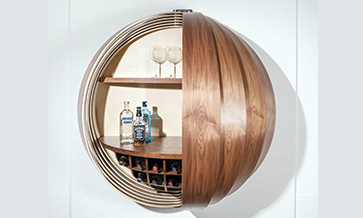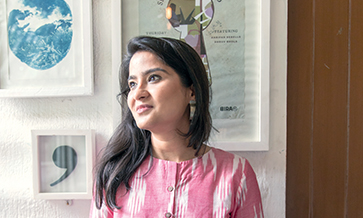Vermouth is perhaps one of the least understood alcoholic beverages in India. Most Indians haven’t tasted it, and many don’t even know it exists. But if you enjoy a well-made Martini, Manhattan or Negroni, chances are you’ve had vermouth – without realising it was a key ingredient!
But that’s about to change, and dramatically so. Davana is set to introduce Indian spirits enthusiasts to a homegrown version of this botanical-rich fortified wine, crafted with local ingredients and an unmistakably Indian sensibility.
Davana is crafted by infusing curated botanicals with premium Indian Chenin Blanc wine sourced from Maharashtra’s Nashik vineyards, replete with rich aromatic profile of the curated botanicals, spices and other ingredients – 23 for the Rosso and 21 for the Bianco to be exact – all sourced from within the country.
For bars and restaurants that have long relied on imported vermouth – often plagued by erratic supply chains and inflated prices – this launch offers more than novelty: it solves a problem.
VERMOUTH VISION
Tucked away in a quiet pocket of Goa, amid swaying coconut palms, stands Naveen Distillery. Established in 1964, it is now helmed by third-generation owner, Adarsh Gadvi.
Adarsh is an engineer and an MBA from Bengaluru’s Christ University. His low-profile and quiet demeanour does not totally hide the underlying steely resolve that is apparent when you talk to him.
Having spent 5 years in Pune’s finance sector, in 2018 he returned to Goa and assumed the keys to one of India’s oldest licensed alcohol units – still best known across Kerala for a fortified Port wine that commands roughly three quarters of that market.
At the time, the distillery focused exclusively on wine. The original IMFL lines had been shut down years earlier by his father, who devoted the facility entirely to Port production.
Though the wine business was profitable, Adarsh sensed the need for reinvention. The company’s dormant IMFL licence, quietly renewed each year, offered a chance to explore something new.
POT PIVOT
One of Adarsh’s first moves was to transform the distillery into a hands-on R&D laboratory. By offering contract bottling for emerging spirits brands, he exposed his team to the rising demand for botanical-rich craft spirits. In 2019, he installed a copper pot still. Officially, it was for clients – but after hours, it became his playground.
Soon after, a chance visit from the Russian alco-tech specialist, Evgenii Savvateev – who subsequently became the co-founder of the brand – changed everything. Known for coaxing deep flavours out of obscure herbs, Evgenii became an informal collaborator.
Together, the duo began experimenting with base wines from the distillery and infusing them with botanicals in the pot still.
Wormwood (essential to vermouth) entered the story almost by accident when Evgenii mailed 2 kg of Artemisia absinthium from his Moscow backyard. The herb’s bitter backbone sparked a flurry of trials, but importing dried leaves for small batches proved impractical.
Undeterred, the team trekked through Maharashtra to fortuitously find a comparable strain growing wild, solving the supply dilemma and lending the project an all Indian ethos.
Over the next 2 years, more than 50 micro-batches were developed in search of the ideal blend. “When you start with a few ingredients, you don’t always know which botanical or spice will overpower,” says Adarsh. The process was rigorous, rooted in chemistry, but guided by trial and error, and a touch of intuition.
MARKET MODE
In late 2023, a pilot batch was released – unlabelled and unpublicised – into select Goan bars. Bartender feedback poured in: “too sweet for a Negroni,” “not thick enough for a spritz,” “just right with soda.”
Adjustments followed, and by March 2024, the team was confident enough to order their first commercial glass. Launched under the name Davana (the Hindi term for wormwood) the brand introduced two variants: Bianco and Rosso.
Both clock in at 15% ABV. Bianco features pale straw tones and notes of vanilla, vetiver and a touch of clove. Rosso, stained ruby with hibiscus, offers deeper flavours: blackcurrant, caramel and coffee.
With these profiles, the brand is not only winning over consumers but also reshaping how vermouth is perceived in India.
The design of the bottle plays a powerful role in branding. “These aren’t just raw design elements,” Adarsh explained. Intricate illustrations of lotus, peacocks, tigers and the aromatic wormwood leaves adorn both the label and neck, reflecting the botanical foundation of the product.
Even the name Davana – projected as Vermouth Indica – was selected to root for and showcase the drink in its Indian identity.

Davana hits the sweet spot between beer and hard spirits, perfect for urban consumers seeking moderation.
PRODUCTION PROCESS
One standout design decision was the use of natural cork stoppers, embossed with a logo in Devanagari script. Though rare in the Indian fortified wine segment, cork not only adds a premium touch but slows oxidation. Once opened, however, vermouth must be refrigerated and ideally consumed within two months.
The production process honours both precision and patience. Botanicals low in oil are first macerated in neutral grape spirit; oil-rich ones infuse directly into the base wine.
For three days, the infusion alternates between gentle stirring and rest, allowing flavours to evolve gradually. The resulting blend is adjusted to the upper limit allowed by the FSSAI for wine and bottled without barrel ageing.
Bars that have experimented with Davana are delighted to have a high-quality Indian vermouth option. Imported vermouth, often delayed by shipping backlogs or priced out by taxes, has long frustrated bartenders and sommeliers. “This is a game-changer,” said one Bengaluru bar manager. “We now have a locally made vermouth we can count on.”
POURING, PAIRING
At a recent tasting session in Bangalore, both Davana variants were presented both as an aperitif and in cocktails. We got to taste an interesting highball curated by Davana’s Brand Ambassador, Chethan M.V: one part vermouth, two parts soda over ice.
For creamier texture, Chethan produced the Purple Mirage, a cocktail that was made with Rosso, spiced jamun syrup, kaffir lime salt rim and soda. A lighter Blooming Breeze cocktail was the Bianco with fresh apple juice and elderflower syrup, relying on natural pectin for foam instead of egg white.
The cocktails were paired with interesting hors d’oeuvres that brought out and accentuated the flavour profile and notes of the brands. Davana hits the sweet spot between beer and hard spirits, perfect for urban consumers seeking moderation. With international spritz culture making its way to India, this drink is poised to become a staple.
The 750-ml Davana bottles are now available in Goa (₹1,100), Mumbai (₹1,650) and Bengaluru (₹1,350) while the Pondicherry market is on the cards. For Adarsh, each state brings its own maze of rules: labelling, taxation, and even definitions of fortified wine.
The team is committed to quality over quantity. A 5,000-litre run is the current cap, with the 3-day infusion protocol remaining untouched. A lower-sugar extra dry version is in the pipeline, as is a limited barrel-aged release. Watch this space for more!














